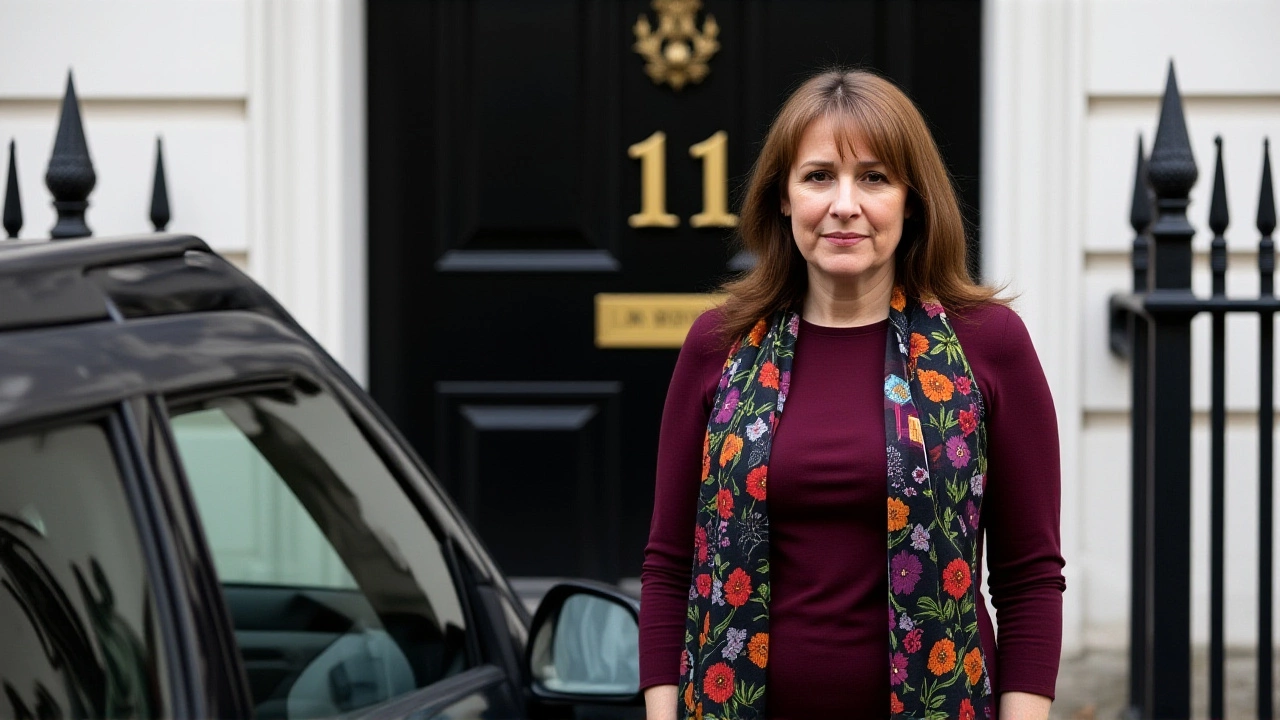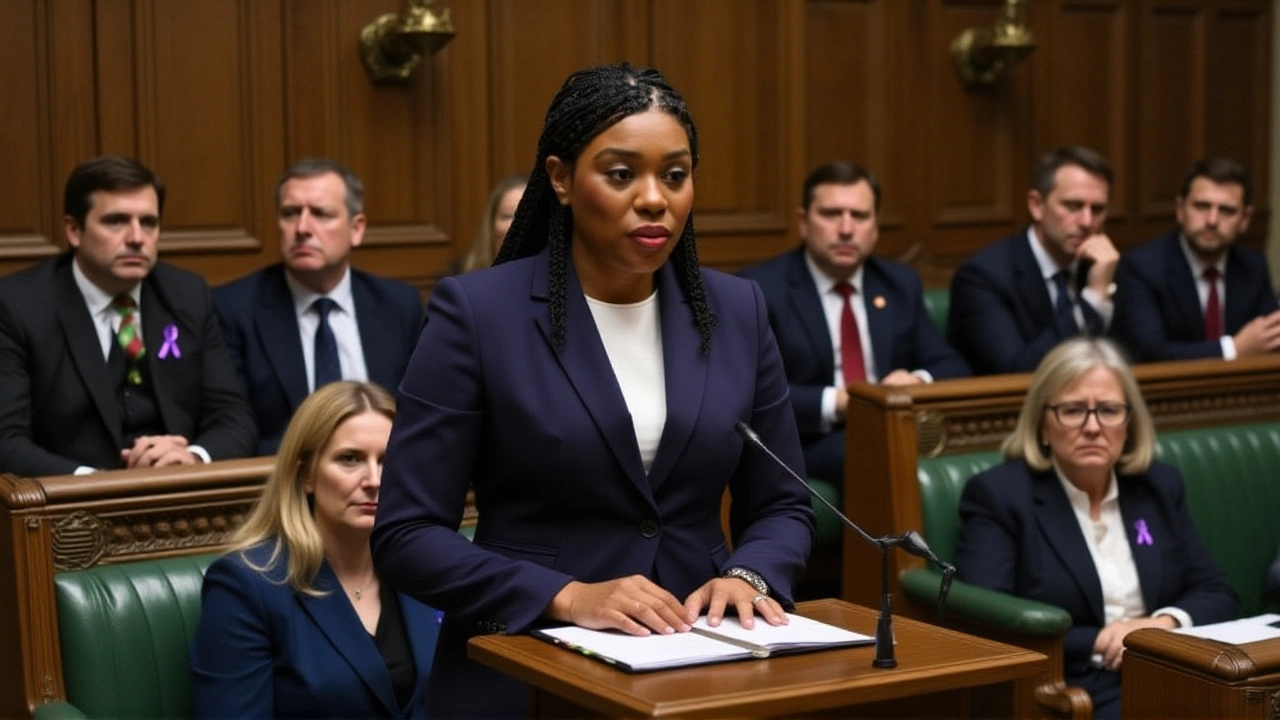When Kemi Badenoch called Rachel Reeves "cowardice" on Tuesday, November 25, 2025, she wasn’t just firing off a political jab—she was betting the entire future of the Conservative Party on voter frustration with Labour’s economic flip-flops. The target? The Autumn Statement London, due the very next day, where Rachel Reeves, Chancellor of the Exchequer, was expected to unveil a budget that, according to multiple Treasury sources, had quietly scrapped plans to raise income tax. The twist? Labour had floated the idea just weeks earlier. Now, they’re silent. And Badenoch is screaming into the silence.
"They Don’t Know What They’re Doing"
Badenoch didn’t hold back during her Sky News interview on November 24. "I’m not a man," she shot back at Reeves’ claim that critics were "mansplaining" how to be chancellor. "And I think she’s doing a terrible job." It wasn’t just personal. It was structural. She pointed to September’s GDP data—the UK economy shrank—as proof Labour’s policies were choking growth. "Day before yesterday, we had GDP figures that show the economy is flatlining," she said. "In September, it shrunk. And the last budget? It’s made businesses stop hiring. Period." She zeroed in on the Employment Rights Bill, which she claims will cost businesses £5 billion. "That’s not a policy—it’s a jobs tax," she told reporters. "I’m out of business in my own constituency today. Not because of inflation. Not because of global markets. Because of this bill."The U-Turn That Broke Trust
Here’s the thing: Labour didn’t just change its mind. It made the public wonder if it ever had one. During Prime Minister’s Questions on November 19, Badenoch directly challenged Keir Starmer: "Why is your government the first to float increasing income tax rates, only to then U-turn on it?" Starmer’s reply? "I’ll inform her the budget’s actually next week. It’s a Labour budget with Labour values." That answer didn’t land. Not with voters. Not with businesses. Not even with Labour’s own allies. Lord Ashcroft Polls, released November 22, found that two-thirds of voters believe they’ll be worse off after the budget. And here’s the kicker: most think it’s because Reeves is planning to raise taxes—not because of external forces, but because of Labour’s own indecision. "Britain spends too much, rather than tax too little," said the poll. That’s not a tax problem. It’s a credibility problem.What’s Really at Stake?
Badenoch’s attack isn’t random. It’s surgical. She’s targeting three pain points: the freeze on income tax thresholds, which she says is silently pulling money out of working families’ paychecks; the hike in the minimum wage, which she argues will price young workers out of jobs; and the business rates and levies on North Sea oil, which she wants scrapped to unlock investment. "Scrapping the silly levies on oil drilling? That’s not radical. It’s rational," she said. "We’re not asking for handouts. We’re asking for the freedom to grow." Even Peter Kyle, Business Secretary, admitted on November 24 that "there needs to be more urgency" from the government. But he rejected the idea that growth was no longer the priority. "The chancellor will take the fair and necessary choices," he promised. That’s the problem. "Fair and necessary" sounds good on paper. But when voters hear "fair," they think "pain." When they hear "necessary," they think "another tax."
The Doctor’s Strike and the Politics of Anger
On November 25, resident doctors walked out on a five-day strike. Badenoch called it "absolutely shocking," noting they’d received a 28% pay rise last year. "Why can’t they be held to the same standard as police and the army?" she asked. The comment sparked outrage among medical unions—but it also tapped into a deeper current: voters are tired of public sector demands without accountability. In a country where 4.2 million people are on waiting lists for NHS care, the strike felt less like a protest and more like a political gift to the Conservatives.What’s Next? The Budget That Could Break Labour
The Autumn Statement London isn’t just a fiscal document. It’s a referendum on Labour’s economic competence. If Reeves announces tax hikes—even modest ones—she risks alienating middle-income voters who were supposed to be Labour’s base. If she announces no hikes, she risks fueling the narrative that Labour is directionless. And if she hides behind "fiscal rules" while GDP continues to shrink? That’s when the real damage begins.Starmer’s defense—that his government has delivered five interest rate cuts—isn’t enough. Voters don’t care about rate cuts when their paychecks are shrinking. They don’t care about "ironclad rules" when their small business is closing. And they sure don’t care when their chancellor refuses to say what she’s going to do.
Badenoch knows this. That’s why she’s not just attacking Reeves. She’s positioning herself as the only adult in the room. And with two-thirds of voters convinced Labour is mismanaging the economy, she might just be right.
Frequently Asked Questions
Why is the freeze on income tax thresholds such a big deal?
The freeze means income tax bands haven’t risen with inflation since 2021. By 2025, an estimated 5.3 million workers are being pushed into higher tax brackets without a real pay increase. That’s an average loss of £420 per year for a typical earner—money that’s vanishing from household budgets, not from government waste. Badenoch calls it a "stealth tax," and data from the Institute for Fiscal Studies backs her up.
What’s the real impact of the Employment Rights Bill?
The bill, passed in early 2025, expands protections for gig workers and introduces stricter rules on dismissals. The Confederation of British Industry estimates it will cost SMEs £5 billion annually in compliance and legal risk. Many small firms in sectors like retail and hospitality have already cut back on hiring, particularly for under-25s, fearing lawsuits. The government says it’s about fairness. Critics say it’s a job killer.
Why do voters think Britain spends too much instead of taxing too little?
Lord Ashcroft Polls found that 68% of voters believe public spending is out of control—not that taxes are too low. They point to ballooning welfare costs (£115 billion in 2025, up 14% since 2022) and NHS overspending. The perception isn’t about tax rates—it’s about waste. Voters see Labour abandoning welfare reforms and doubling down on spending, which makes them distrust any tax promises.
Is Kemi Badenoch credible on economic policy?
She served as Treasury Minister under Liz Truss during the 2022 market crash, which cost her credibility with many. But her current critique isn’t about her past—it’s about Labour’s present. Voters aren’t comparing her to past Conservative chancellors. They’re comparing Reeves to what they see on their payslips and in their local shops. And right now, that’s not a fair fight for Labour.
What happens if Labour doesn’t raise taxes in the Autumn Statement?
It could backfire. Without new revenue, Labour risks breaching its own fiscal rules, which require borrowing to fall as a share of GDP. If they don’t raise taxes, they’ll have to slash spending—likely on public services. That could trigger backlash from unions and voters who expected "fair" investment. Either way, they lose. And Badenoch is ready to pounce.
How will the Autumn Statement affect ordinary families?
If no tax hikes are announced, families might see a brief reprieve—but inflation and energy costs remain high. If taxes rise, even slightly, the average household could lose £180–£300 annually. But the bigger hit is psychological: uncertainty. Businesses are delaying hiring. Parents are cutting back. And that hesitation? That’s the real cost of political chaos.

